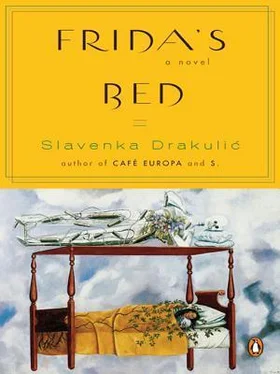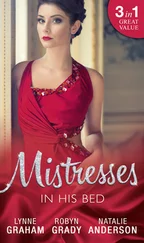Her hair was splayed out on the pillow, damp and sticky to the touch. The odd streak of gray flecked her still-thick dark mane. It occurred to her that she ought to wash it, but then she laughed at her own automatic reaction. Her body would not respond just like that. She lifted her hand and brushed away the stray wisps from her brow. Her hair was the only part of her that was still alive. Her father had had a luxuriant head of hair. She remembered how he would sometimes stop in midsentence and run his fingers through it and how she had loved that gesture, that sign of absentmindedness. He would tell her that her hair was as strong as a horse’s. The Maestro would bury his head in it, inhaling its fragrance. He would tell her something quite different, that her hair was as soft as the finest silk. She always thought of him when she brushed her hair, how he would unbraid it at night and she would feel his warm breath on her neck. And how these two most important men in her life saw her hair so differently.
She was alone in the room. Her father had died long ago and the Maestro was in another woman’s bed. Kity was tired and her friends were far away. She was increasingly afraid of the light and the inexorable advent of day.
As day broke, she thought of that first meeting with the Maestro and what she would tell him if he were here with her now.
Maestro, she would say, I remember the first time I undressed and stood naked in front of you. I hesitated, of course. I was so young, twenty years younger than you, and so unsure of myself — my only weapon was to be bold. I decided to test you by showing you my body, starting with my back. I wish I could have seen your eyes as they examined me. My withered leg. The scars from my operations, all the things that were for my doctor’s eyes only. I wanted you, but at the same time I was afraid, my heart was in my mouth. Climbing the stairs up to your studio, I said to myself, No, I won’t undress in front of him, I can’t risk losing him so soon, I care about him too much. And the next moment I decided to do the exact opposite. I will undress, immediately, let him look, let him see everything right away! I won’t play hide-and-seek, not with this man. If my body disgusts him, I’ll survive. I’ve survived worse. I’m armor-protected both inside and out, I’ve got thick skin.
But all the while I hoped you would recognize that other me, the one not visible to the naked eye, the one who lives deep in a hole and comes out only in the paintings.
And then we entered your studio. All I remember is the light, bright, sharp, unrelenting. As soon as you closed the door you grabbed me in your arms in that way that later became familiar. I pushed you away, hard. You lost your balance for a moment, surprised by my roughness, and I laughed. You thought it was a game, that I was playacting, and then in the middle of your studio I stripped naked and turned my back to you. Go ahead, take a good look, I said. First look at my back and all the scars from all the operations, and at my withered leg and crooked foot, and then come here if you’ve got the guts, if you still want me.
Had I ever thought of myself as a cripple before then? I loathed the very word. Why would anyone be useless just because she was lame? I rejected the very idea that the word could apply to me, even though I had known since childhood that that was what people thought when they saw me limping. When we first met, I felt good and only occasionally did I drag my leg. When I showed you my body in the clear light of day in your studio, I understood for the first time the true meaning of the word because it was inscribed down the length of my back by the crude incisions of the surgeon’s scalpel. I was marked. Branded. I felt humiliated and afraid, the way I used to when I was a child riding my bike through the park and the other little girls would call out after me, There goes Peg-leg! Maestro, I could not even imagine what a painter who had possessed the most beautiful women in the world would see in me. I felt your probing eyes move down my back, stopping at each scar as if to inspect my map of pain. I don’t know how long I stood there like that. When I turned around you looked at me, wide-eyed, as if I were a ghost.
Then you picked me up in your arms. You laid me down in the copper tub and turned on the water. I lay there, my eyes closed, while you soaped me down, your hand carefully touching my skin as if you were afraid of hurting me. For the first time I felt sure that I was not alone anymore. And then a miracle occurred, Maestro, you recognized me, and that is why I want you with me now, I do and I do not want you.
No one has ever been as naked as I was then. Normal people are merely naked. But my body was both naked and wounded — it was vulnerable. My scars did not frighten you. It is through scars that one touches a person’s solitude. I learned that from you, with you, that day.
Later I painted those scars, to let others reach into my solitude.
She looked again at the bedcover, for the leg that was no longer there, though it still felt like a living part of her. She could even wiggle her toes.
When she thought of all the humiliation she had suffered because of that leg! It struck her that this was the same leg that the Maestro’s ex-wife Lupe had made fun of at her wedding twenty-five years earlier. It was not until they had finally amputated the leg she had so reluctantly dragged around all of her life that she realized the woman had been right. The beautiful Lupe had been drunk and miserable because the Maestro was marrying Frida. It was nightfall by the time they had gathered in the sitting room (cognac, tequila), people were dancing, drinking, sitting on the divan. And then, at one moment, Lupe flipped open the slit in her narrow black skirt and displayed her long white bare leg. “Maestro, look at what you’re missing,” she said loudly, too loudly. Lupe knew what she was doing, she knew that there could never be any comparison between her and his new wife, not in that sense. Even Frida’s good leg was no match for hers. Lupe stood there motionless (or did it just seem that way?), like a magnificent marble sculpture, her whiteness dazzling in the semidark room.
Everyone saw her performance, they could hardly have missed it. The smoke, the music, the sound of laughter. Lupe in her elegant, clinging evening gown, her shoulders bare. And Frida in her peasant costume, borrowed from the maid to please the Maestro. To her mother’s horror, she had discarded the white wedding gown on the bed. Furious now, Frida felt like gouging the eyes out of this stupid woman who was humiliating her at her own wedding.
Doña Matilda, who was dressed more for a funeral than for a wedding, also saw the proffered leg. Stern and stiff, she was the exact opposite of Lupe, but also of her own daughter, who was more like Lupe than either one of them would have liked. Frida looked at her mother and noticed that she was blinking rapidly, as if she could not see properly or could not believe her own eyes. She knew her mother’s body language only too well, her reservedness, her fear of closeness, of physical contact. The lapse lasted only a second. Then Doña Matilda pulled herself together, reverted to form and quickly turned away. For something like that to happen at her daughter’s wedding, for his ex-wife to bare herself publicly like that! Was there no end to the shame her daughters would bring down upon her? Matilda had run away from home. And this one had married an old man, wearing the maid’s clothes, yet! And now this scandal with the leg.
Doña Matilda flinched, as if she had been scalded, as if she had never seen a bare leg before. Frida saw how horrified her mother was, not so much by the sight of a firm, smooth body as by the thought of what it might arouse in a man. She was hurt by her mother’s obvious, perpetual fear of another woman. Even at the wedding Doña Matilda did not believe that her poor infirm daughter could emerge victorious. And if she did, the victory would be short-lived. She would not be able to parry the beautiful women who constantly surrounded the painter — rumors about him had reached even her ears. Doña Matilda already sensed how hard the fight to hold on to the Maestro would be, and how much Frida would suffer.
Читать дальше












